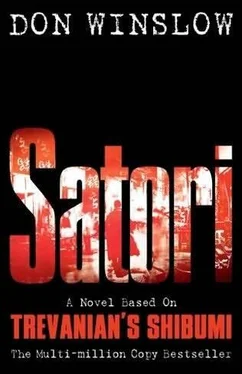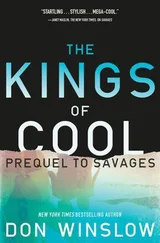So could she. “Please don’t let me die down here.”
“I won’t let you die anywhere,” he said.
Another blast rocked the tunnel. Dirt fell into their faces, their eyes, their noses, their mouths. He felt for her face, brushed the dirt away, then turned onto his back and started to pull himself along the tunnel shaft, pulling her behind him.
It was excruciatingly slow and he knew she was losing blood fast. The tunnel was collapsing, they were half buried, and he could only feel his way along, turn his head, and try to smell the way to open air.
He had to do it. He couldn’t let her die.
After an eternity he turned, saw a faint beam of sunlight, and sensed a fleeting breath of fresh air. He pulled until they reached the bottom of the tunnel entrance.
“We’re there,” he gasped.
Now he clawed his way up the shaft with one hand and pulled her with the other. He climbed and fell four times before his hand gripped the surface with enough purchase to pull her weight up behind him.
He collapsed on the surface and pulled her into his arms.
“We’re here, my love,” he said. “We made it.”
But Solange was still.
Limp and lifeless in his arms. He wiped a strand of her golden hair from her green eyes, and closed them.
Then the next bomb hit.
HE AWOKE in a bed.
Clean, crisp sheets tight around his legs.
Haverford looked down at him.
“Good morning.”
“Where…”
“You’re in a Saigon hospital,” Haverford said. “A Foreign Legion patrol found you staggering around out in the delta. You were severely concussed, had some second-degree burns, shrapnel wounds, and three broken ribs.”
“Solange?”
“I’m sorry,” Haverford said.
Then Nicholai remembered.
A deep sorrow came over him.
“Why aren’t I in a cell?” he asked, looking around the room. It was impossibly white and clean.
“Ah,” Haverford said. “Your name is René Dazin. You’re a French merchant that the Viet Minh kidnapped. You were very lucky that the bombing raid happened to set you free, my friend, the same bombing raid that killed Michel Guibert.”
“Who made up that story?”
“I did, of course,” Haverford said. “But you might want to get out of the country as soon as you can walk.”
“Which should be when?”
“Might be another month or so,” Haverford answered. “I have a clean passport for you. You recuperate, then you disappear.”
Nicholai nodded, and even that small move made his head throb. But he was heartened that Haverford thought he needed the passport, even though he had Voroshenin’s multiple identities safely stashed with De Lhandes. The American agent, Nicholai thought, will believe he has me on a leash, and he will be wrong. Then he asked, “Diamond?”
“He made it out,” Haverford said. “Rats usually do.”
“Good,” Nicholai answered, relieved that Diamond hadn’t been killed by an impersonal bomb. He would visit Diamond personally and hold him to account. Not only for himself, but for Solange.
Haverford leaned closer and whispered, “Ai Quoc made it too. So did the weapons.”
“You were working with him all the time,” Nicholai said. He saw it now, all of it. Haverford had played a very deep game of Go, and played it well.
“Since we fought the Japanese together,” Haverford answered. “It’s a triple for me – the Soviets and the Chinese at knifepoint, Mao weakened, and a chance for Quoc to take Saigon and end this war before we can get into it.”
“Do your bosses know?”
“I think so,” Haverford answered. “My boss respects victory. I get promoted, Diamond gets put out to graze. Who knows, maybe you and I will get together again sometime for tea.”
“I’d like that.”
“Me too, chum,” Haverford said. “Sayonora, Hel-san.
“Sayonara, Haverford-san.”
Nicholai lay back and looked out the window at the pretty garden in the courtyard outside. Slashes of silver rain started to fall, the beginning of the wet season.
The beginning of a lot of things.
He had a new identity, the means to effect his revenge, access to the Ivanov fortune, not to mention the money he won from Bao Dai. After settling matters with Diamond and his cohorts, he could start a new life.
If indeed, he thought, there is such a thing as a new life without Solange.
There is, he thought, there must be, because you are alive and that is your karma. And it is your karma also that you are free now, truly free.
But to do what? he asked himself. How do you use your freedom? You are a killer, a warrior, a samurai – no, not a samurai, for you are not attached to any master. You are a ronin, a wanderer, an individual. So what does the ronin do now? How do you spend this life that has been restored to you?
You begin by killing Diamond, he decided, and then you go on to rid the world of as many Diamonds as you can. The men who kill the innocent – who torture, intimidate, brutalize and terrorize in the name of some “cause” that they believe in more than their own humanity.
He heard Kishikawa’s voice.
Hai, Nikko-san, it is a good way to spend a life.
He looked out the window and saw the hard rain shear a leaf from a branch. The leaf fluttered to the ground, shimmering gold and green in the rain.
Satori.
First, to Richard Pine and Michael Carlisle, for e-mailing to ask if I knew the meaning of the word shibumi , and for all their enthusiasm, counsel, and support; to Alexandra Whitaker, for her gracious cooperation and generosity; to Graham Greene, for writing the great Saigon novel; to Howard R. Simpson, whose Tiger in the Barbed Wire was essential reading; to Mitch Hoffman for being such a kind, patient, and perceptive editor.
Most of all, of course, to Rodney William Whitaker, a.k.a. Trevanian – I hope I did you proud, sir.
Three summers ago I was sitting in my room at Oxford University (I was there to speak to a group of international students) when I received an e-mail from my agent, Richard Pine, that said, “Does the word shibumi mean anything to you?”
I thought, What are these guys doing back in New York, crossword puzzles?
But I wrote back helpfully, “It means ‘understated elegance’ in Japanese.”
Richard responded, “How did you know that?”
I answered with what I thought was obvious: Back in the day there had been a famous book called Shibumi, which a bunch of my friends and I just gobbled up. It featured an assassin named Nicholai Hel who was, inter alia, an expert in the Japanese game of Go. We all took up the game (I was terrible at it) and played it well into many nights. I also recalled that Hel had a villa in the Basque country that he tried to imbue with the spirit of shibumi. The book, I needlessly typed to Richard, was written by an author whose pen name was Trevanian.
Figuring that I had put this curious correspondence to bed, I turned on the electric kettle to make myself a cup of Nescafé. It was a typical English summer day with the rain pelting against the window like the clacking of an old typewriter, and I was looking to the coffee to keep the chill off as I searched for a pair of dry socks and a snorkel with which to venture out for my next lecture. So, in truth, I was a little annoyed when I heard the bong of another e-mail summons and thought that, prominent literary agents that they are, Richard and his cohort Michael Carlisle at Inkwell could probably figure out a ten-letter word for “total destruction” without my help.
Читать дальше












